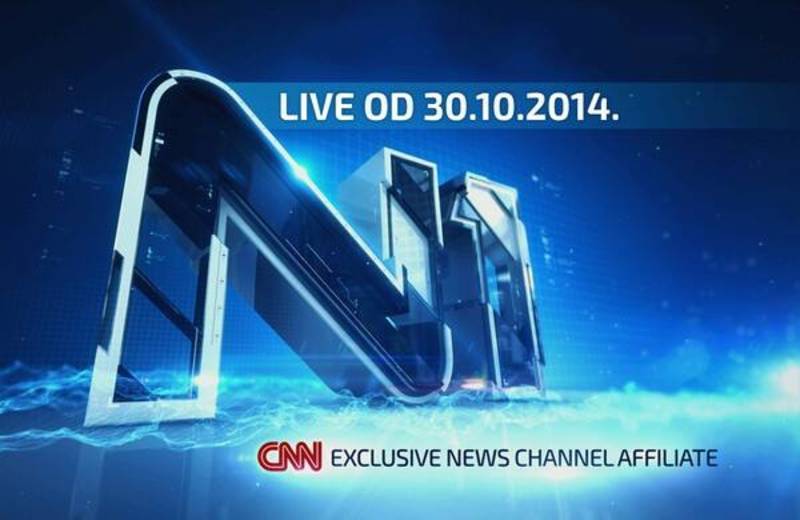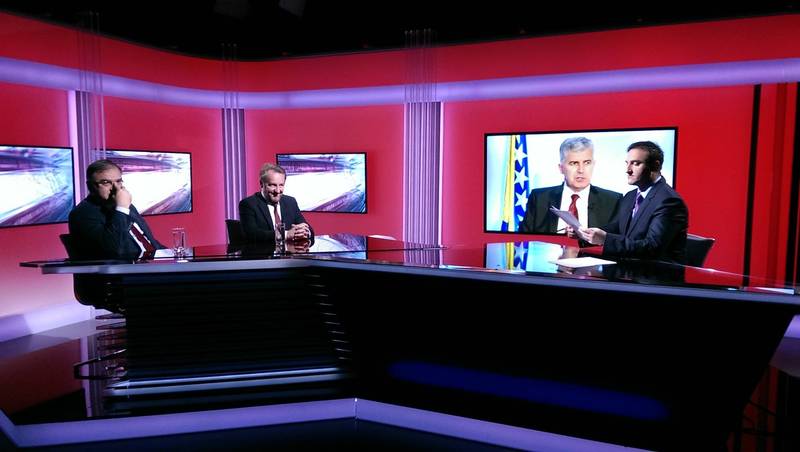EU Is Lagging Behind on the Media Front
Adelina Marini, November 3, 2014
EU can and should have a bigger role in supporting media freedom and pluralism in the EU and beyond. This is how begins the report of the high level group on media pluralism and freedom, established by the former European commissioner for the digital agenda and media, Neelie Kroes, published in the beginning of 2013. The mandate of the group was to prepare a report for the Commission with recommendations for the respect, protection, support and promotion of pluralism and freedom of the media in Europe. Alas, since then, there has been no substantial change in the way the EU treats media in the member states and the candidate countries. But against the backdrop of the geopolitical media situation, the report, too, is already too outdated.

Last week, on the media horizon in the Balkans has emerged a new star - the Balkan CNN, the N1 regional TV. Ever since the time when the West was trying to reach the democratic forces and to cultivate democratic opposition on the other side of the Iron Curtain through media funded by governments, like the language newsrooms of the BBC, Deutsche Welle, The Voice of America, Radio Free Europe, etc, a lot of time has passed. After the end of the Cold War, a gradual retreat has begun of media sponsored by western governments because it was believed back then that the old world order is completely over. 25 years later, however, there is a serious media colonisation going on in the fragile and disputed areas across the globe. The appearance of the Qatari TV Al Jazeera has seriously changed the media conjuncture globally since the media now has a branch even in the US, but strongest its influence is in the Middle East and the Balkans.
Iran, too, is funding a media project of its own - Press TV - which broadcasts in English, but is not as influential as Al Jazeera. The Qatari television station became especially popular a little after the beginning of the war on terror and the wars in Iraq and Afghanistan by provoking western societies with broadcasts of video messages by leaders of the Al Qaeda terrorist organisation. Russia, too, has returned to the good old method of propaganda as a foreign policy tool. Not only that the Kremlin holds a tough grip on media in Russia, exerts influence in many countries in the former Soviet space, but it also funds an English-language channel which is already well known - Russia Today (RT). As of this week, although quite late, the Balkan CNN has been launched - the N1 TV station, which is an exclusive partner of the CNN for the region of former Yugoslavia. It acts as a rival of the Al Jazeera Balkans, but is likely to have a serious impact on the media landscape in the region.
N1 broadcasts from three centres in former Yugoslavia - Belgrade, Zagreb and Sarajevo. This is the same axis Al Jazeera Balkans uses. The television works in the local languages, with local journalists and provides a different point of view to the news from the region and the world to that of Al Jazeera Balkans or national media. This will indisputably have a huge impact on the region and practically is a statement of return of the US in the Balkans under the new rules of the geopolitical game - the media front. According to local media, the owner of the TV station is the Global Institute of the investment company KKR, on the top of which stands a very well known figure - General David Petreus. He was a supreme commander of the coalition forces in Iraq and Afghanistan. Later he was director of the CIA.
Against this backdrop, the EU seems even more incapable to join in an adequate way the race for the hearts and minds of strategically important for the Union regions like the post-Soviet space and the Balkans. The EU finances with money from the common European budget the Euronews TV station, which is in English, but it can hardly be described as influential or that it serves as EU's voice, especially in foreign policy terms. EU is also funding on a project basis, without a comprehensive media strategy, various media outlets in the EU and beyond. There are no visible results, however.
The media environment in the Balkans, but also in many of the former totalitarian states, is strongly dependent on oligarchic or political interests or, quite often, a combination of both. The Union quite recently started to realise this problem. Last year, for the first time, the Commission paid serious attention to media situation in the progress reports of the candidate countries mostly because the situation has already reached critical levels, making impossible the creation of sustainable democracy and, most of all, of a European system of values. The latter, although unofficially, is a precondition for EU membership, because the European values are part of the EU's founding treaties, so every acceding country has to sign up to them. The EU, though, has sufficient experience that a signature under the EU Treaty is not enough to enable the European values grow deep roots in young democracies.
One of the recommendations in the report, initiated by Neelie Kroes, as a matter of fact, is precisely this - media freedom and pluralism to play an essential role in evaluating the candidate countries' progress toward EU accession. In this year's report on Serbia, which is a key and strongly dependent on Russia country, in whose capital city the N1 headquarters are based - the Commission points out that although some important steps have been made in applying the 2011 media strategy, there is a deterioration of the conditions for the freedom of expression. One should not necessarily read the EU's documents to understand that the Union, but also democracy in the countries in the region, has serious problems with the media environment. It suffices to watch for a while the local television stations to get a good picture. This was especially evident in Serbia during the visit of Russia's President Vladimir Putin in mid-October.
The absence of the EU was especially strong that day. The problem is that the Union's absence as a topic and as positions is striking in the whole region. In 99% of the cases, when the EU is mentioned, it is mainly about the EU funds, negotiating chapters, a good or bad report, sanctions to be imposed on Russia and nothing else that could help people understand what kind of an organisation they are going for. This proved a big problem for the seeding of the European system of values in some of the new EU member states, like Bulgaria, for instance, where the EU, too, is practically absent from the media attention. Moreover, the presence of the Russian point of view is too strong. Often, in various media in Bulgaria, you can read news about the EU from the Russian news agency ITAR-TASS which is ridiculous.

If the EU wants to enhance its foreign policy weight and not to lose the battle for the strategically important regions, it should very seriously consider joining the media front with a strong television station in different languages that would promote the European point of view, values and policies. The lack of common European positions, interests and benefits from proximity with the EU is very strongly felt in the member states as well. In the euro area countries, the EU is present mostly as a source of the problems with unemployment, poverty, in other countries as a source of poor migrants or as someone who punishes. Frequently, there is distortion of what has been agreed at EU level and what later is being told by the national leaders, ministers or members of parliament in the capital cities. This is what a future TV station could change - put an end to the Chinese whispers game.
In parallel to enhancing its media presence in the EU, the Union should also work in its periphery and neighbourhood. The creation of a powerful European TV or other media channel would not cost the common European budget a lot of money, but it will significantly increase the EU's weight as a geopolitical factor and domestically it could notably mitigate the quickly growing and gaining political power anti-European voices. This would be a real projection of the soft power the EU is so famous about, but has so far failed to achieve its goals.
Someone might think this would be a European propaganda instrument which will be against the European perception of the world. However, the propaganda machines are a fact and are becoming more and more powerful. EU has a weak common foreign policy and little tools at its disposal to exert influence. The neighbourhood policy proved this when the Arab Spring broke out, when Russia attacked Ukraine to prevent it from getting closer to the EU or when the situation in the Middle East got much more complicated than before. The EU is not there and this is a fact. It is not too late, especially given the change of guard in the European institutions, to consider a comprehensive media strategy as a foreign and domestic political instrument that imposes high media standards and the fundamental European values.
 Bakir Izetbegovic, Andrej Plenkovic | © Council of the EU
Bakir Izetbegovic, Andrej Plenkovic | © Council of the EU Aleksandar Vucic, Recep Tayyip Erdogan | © Serbian Presidency
Aleksandar Vucic, Recep Tayyip Erdogan | © Serbian Presidency Jean-Claude Juncker, Zoran Zaev | © European Commission
Jean-Claude Juncker, Zoran Zaev | © European Commission